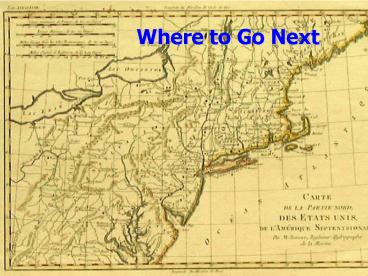Where to Go Next - PowerPoint PPT Presentation
Title:
Where to Go Next
Description:
Where to Go Next. Outline. Announcements: Homework IV due Wed. 10/8 by 5, by e-mail ... What I haven't told you, & where to find out more. Course Evaluations. Homework ... – PowerPoint PPT presentation
Number of Views:30
Avg rating:3.0/5.0
Title: Where to Go Next
1
Where to Go Next
2
Outline
- Announcements
- Homework IV due Wed. 10/8 by 5, by e-mail
- Extra week for projects
- Absolutely no exceptions!
- Answers will be posted on web
- I will be available during office hours by
appt. - Homework III answers on web
- Homework III
- AdvDiff1D example
- What you know
- What I havent told you, where to find out more
- Course Evaluations
3
Homework
- Solution to 6 was harder than I thought
- x1 2 3 3 3
- ddiff(x)--gt1 1 0 0
- ddiff(d)--gt0 -1 0
- find(d0)--gt1 3!
- Need to do the diff and scan for n-1 0s.
- I
- for j1length(d)-n2
- if(sum(d(j(0n-2)))
- II,j
- end
- end
4
Cookie Awards
- Idea is to find where diff(I)1
- Winners
- Louise McGarry
- Ning Zhang
- Prabuddha Sengupta
- Min Wu
5
Numerical Solution
- This is a matrix problem
- ACtdtf(Ct)
- Each grid point will have a row in matrix A
- A(j,)0 0, -?, (12? ), -?, 0 0
- All rows are the same except for first and last
- We need to specify what happens at end points
- Boundary conditions are a big problem
- Well use periodic BCs
- C(0)C(1), so first and last rows are
6
Numerical Solution
- Algorithm
- build A
- for j1n
- build RHSf(Ct)
- CtdtA\RHS ----- very time consuming!
- end
7
Numerical Solution
- Same A used in each iteration
- Factor once
- build A
- L,Ulu(A)chol would be better..
- for j1n
- build RHSf(Ct)
- yL\RHS ---forward substitution
- CtdtU\y ---back substitution
- end
8
Sparse Matrices
- A is sparse
- the only non-zero elements are immediately above,
below, and on the diagonal - corners for periodic BCs
- Matlab has special sparse matrices
- much less memory (dont need space for 0s)
- faster to process
- Asparse(I,J,S) forms A s.t. A(I(j),J(j))S(j)
9
AdvDiff1D.m
- Uses slightly more complicated procedure for
advection known as Lax-Wendroff method - Must specify
- Initial concentration C0
- parameters (u, k)
- size of domain L
- length of time T,
- dx, dt
- Returns x, t, and C(x,t)
10
What Do You Know?
Data Program Output
Currents SSH Geostropic eq. U,V,plot
Weather T,V,M Finite diff. T,V,M in future
Bioinfomatics ATCGCGTA Search for genes Location of genes
Electronics Signal FFT Plot of spectrum
- You know enough Matlab to solve any of these
problems
11
What Do You Know?
- You know how to
- get ASCII and binary data into Matlab
- data are stored in arrays (vectors, matrices,
ND-arrays) - Manipulate data with array operations
- find, relational and logical operators
- get data out of Matlab
12
What Do You Know?
- You know that Matlab has built in functions for
- statistics
- graphics
- solving ODEs
- optimization
- linear algebra
13
What I Havent Told You
- Matlab has lots of functions, and youll never
know them all - learn about functions through
- help, helpwin, or help browser (through GUI)
- www.mathworks.com
14
What I Havent Told You
- Other important packages
- splines (turn anything into a smooth function)
- signals (beyond FFT)
- finance (follow the money)
- mapping (explore your world)
- Simulink (GUI for creating dynamical systems)
15
What Do You Know?
- You know how to extend Matlabs capabilities
through functions - function outputsfname(inputs)
- And that Matlab is a procedural programming
language - Iterations with for while loops
- Conditionals with if-elseif-else-end
- error(estring)
- And that Matlab functions can be polymorphic
- nargin, varargin, etc.
16
What Do You Know?
- Matlab is more than just arrays of doubles
- structs--similar to C-structs or Java objects
- cell-arrays-- arrays of anything
17
What Do You Know?
- Matlab can do graphics
- plot--plots of 1D functions
- bar--bar plots
- surf, pcolor--plots of 2D functions with color
- Matlabs graphics can be programmed
- Build functions for specialized graphics
18
What I Havent Told You
- There are lots of graphics functions
- patch, imagesc, plot3, fill, isosurface
- Graphics have lots of properties to play with
- color, light, markers, text, size, position
- Matlab has a system for working with graphics
- handle graphics
- Shameless plug for CIS 402!
19
Other Scientific Computing Courses
- CS421--Introduces basic concepts and issues in
scientific computing and numerical analysis - CS621, CS622, CS624--Advanced scientific
computing and numerical analysis (Matrices,
Optimization, ODE/PDEs) - Math and Applied Math offer courses on linear
algebra, ODE/PDEs - Domain-specific courses in your department
20
Evaluations
- Please give me as much data as you can
- specific lecture/topics you liked those you
didnt - other topics to cover?
- were tutorials useful?
- Thanks!































